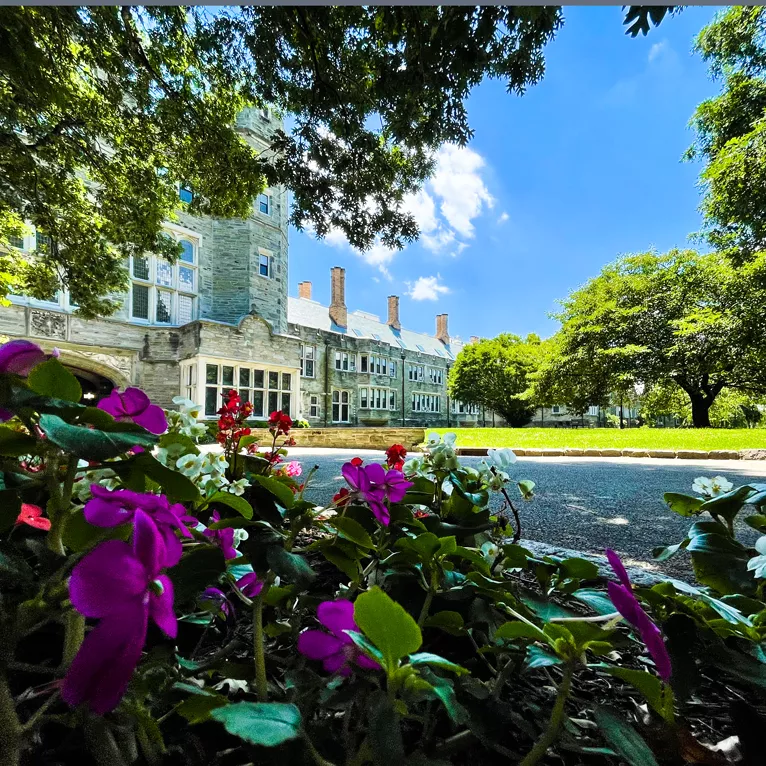Environmental Protection
These programs are aimed at reducing risk to the environment by following prevention measures and regulatory compliance.
Programs/Guidance/Information
This invasive planthopper has spread throughout Pennsylvania since 2014 and has the potential to devastate crops and the quality of life for people living in heavy infested areas. With their piercing sucking mouthparts, they feed on sap (note that they cannot bite or sting people) and can weaken the crops or cause the formation of sooty mold. To help slow the spread, the PA Department of Agriculture implemented quarantine areas across the state and have increased educational efforts to better understand these insects.
To do your part, you can report sightings to the PA Department of Agriculture and kill the spotted lanternflies you see.
The intent of the Pest Management Policy is to inspect, identify, monitor, evaluate, and control the pest population across Bryn Mawr College. This is accomplished via collaboration with a pest management company along with applied prevention techniques. The pest management company routinely visits BMC to monitor traps and treat areas both outside and inside our facilities. All reports of infestation and treatment are reported to Facilities Services. All pests are managed to reduce potential health hazards, prevent loss or damage, prevent larger infestations, and enhance quality of life for students, faculty, and staff.
- Report all infestations to Facilities Services (x7930) as soon as possible. This includes sightings of pest or their casings, droppings, damaged materials such as papers and fabrics, and bites, rashes, or welts on skin.
- Report broken or missing window screens, cracks, holes, unsealed windows, or AC units to Facilities Services as soon as possible.
- Keep all food and drinks in a hard plastic or metal container with lid. Do not leave food out for extended periods.
- Maintain good housekeeping in dorms, offices, and classrooms.
- Do not leave paper products, garbage, or other trash items laying on the floor or in over filled trashcans.
- Do not leave doors and window open.
Allergies/Reactions
For students, reactions to pest should be reported to the Health and Wellness Center (610-526-7360). For employees, reactions should be reported to your supervisor and a Report of Work-Related Injury or Illness submitted to Human Resources. Employees may utilize a Panel Provider as needed.
Bat Management
Pennsylvania is home to nine species of bats who feed on insects. These mammals generally like to avoid humans. They will however cohabitate with humans when shelter, food, or water is discovered. They can enter a living space through small openings such as an open window, a vent, or small gap anywhere in the structure.
Prevention Techniques
- Keep window screens and exterior doors closed.
- Report all broken screens, cracks, or holes to Facilities Services (x7930).
Bats should not be handled or touched by an untrained person because evident contact with a bat is difficult to notice. In the event you see a bat, leave the area, and contact Facilities Services or Campus Safety (x7911). Faculty and students should not attempt to capture a bat.
The College’s policy for asbestos is management in-place, meaning asbestos is only handled or removed, when necessary, before renovations, demolitions, when the material could be disturbed or is damaged. Several federal and state agencies also regulate asbestos-related activities including US EPA, PA DEP, PA Department of Labor and Industry, and OSHA. The BMC Environmental Health and Safety (EHS) Department along with hired contractors are responsible for the identification, inspection and control of asbestos containing materials.
If you have additional questions please contact EHS at ehs@brynmawr.edu

Contact Us
Environmental Health and Safety
- For other Environmental Health and Safety matters, please contact Melanie Allen at 610-526-5166 or ehs@brynmawr.edu.
- If the matter can be addressed by Facilities, you can reach them at 610-526-7930 or facilities@brynmawr.edu.
- For workplace injuries, please contact Human Resources at 610-526-5261.